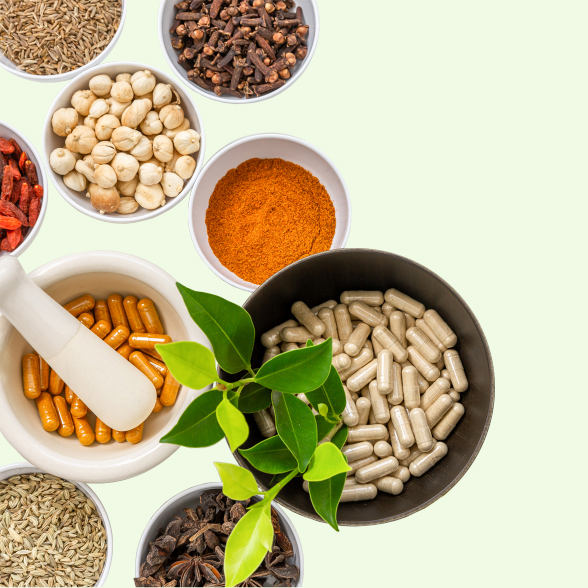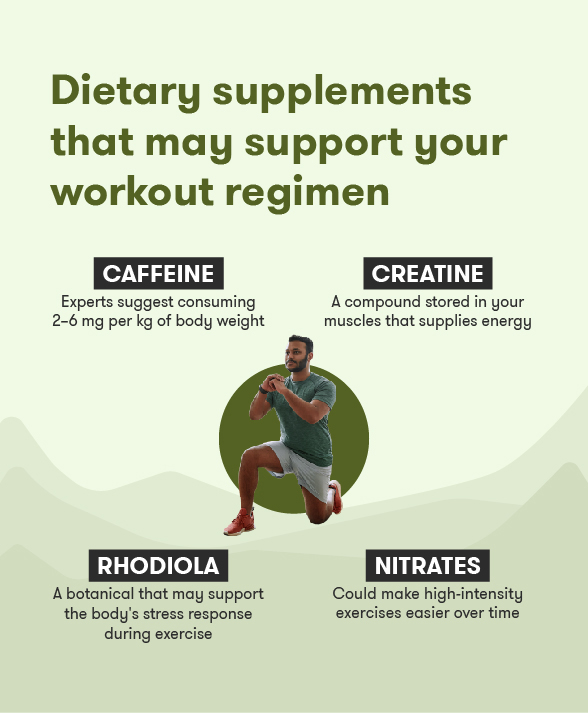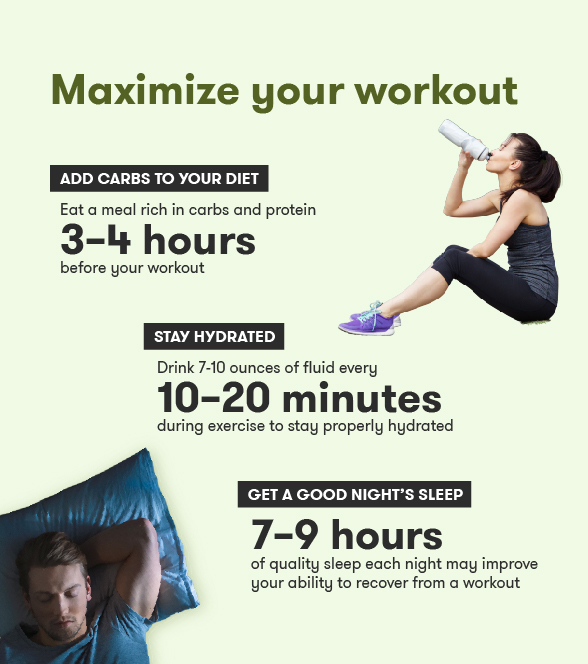January 27,2024

Ready to make the most of your workout? Dietary supplements that contain ingredients like caffeine and rhodiola may be able to help.
January 27 2024
Perhaps you’re a 5 a.m. wakeup-and-workout type of gal. Or, maybe you’re more of the finish-work-and-hit-the-weights man. Either way, there’s a good chance you’ve got your workout regimen locked down and your goals planned out. But, sometimes our bodies need an extra push—especially after a long day at work or a late night out. That’s where dietary supplements can help. Nutrients like vitamins, minerals, botanicals, and amino acids can support your body before and after a workout. You might see them marketed as tablets, capsules, or soft gels, but they all serve the same purpose. So, how might dietary supplements benefit you? Let’s find out.
Why Add a Dietary Supplement to Your Workout Routine?
What’s the deal with dietary supplements? Experts have found they could provide some performance and overall health benefits. Depending on the product, these may include improving endurance, strength, energy, and mental alertness as well as reducing recovery time. That said, dietary and energy supplements aren’t a magic fix. So, it’s important to make sure you’re still getting enough sleep, drinking the right amount of water, and consuming plenty of whole foods in your diet.
Which Ingredients May Help You the Most?
When it comes to supporting your workout regimen, not all exercise supplements were created equal. Luckily, there are a few ingredients that may be able to help.
Caffeine
At some point in your life, you’ve probably reached for coffee to give you an early morning energy boost. So, it should come as no surprise that it can also act as a natural energy supplement before a workout. But, it’s not just the wide-eyed, bushy-tailed feeling that it can provide. Research has found that caffeine can also increase the rate of fat oxidation in your muscles without using up your body’s natural energy in the process. This could mean that your workouts are more effective with caffeine. In addition to your muscles, caffeine can impact several other areas of the body, including:
- The nervous system: Caffeine may help to support focus and energy while reducing fatigue.
- Hormones: Epinephrine or adrenaline can be triggered by caffeine, which could give you the “fight or flight” response that may increase athletic performance.
- Endorphins: Both caffeine and exercise can increase endorphins, which may help support your mood.
- Body temperature: Your morning cup of joe might heat you up in more ways than one by jump-starting your metabolism.
So, how much caffeine is an appropriate amount to take before exercise? Experts suggest consuming 2-6 mg per kg of body weight.

Rhodiola
While it might sound exotic, Rhodiola rosea can be found at your local pharmacy listed as an ingredient in many dietary supplements. Research suggests that this botanical may support the body’s stress response during exercise. So, how does this benefit your workout? You may experience quicker recovery from activity. Other studies have found that Rhodiola might also
aid in improving endurance during exercise, which means you may be able to run an extra mile, hold your plank for another minute, or add an extra rep to your set.
Creatine
Ever heard of creatine? We think it’s time you get to know each other. This compound is stored in your muscles and supplies them with energy. Studies have found that creatine exercise supplements may promote muscle contraction, which can help you achieve maximum performance during your workout. Better yet, creatine may also help muscles recover more quickly after exercise and has even been used to enhance performance during short, high-intensity exercises like sprinting and weightlifting. So, how do you get more of this super-nutrient? Good news—your body naturally produces one gram of creatine per day, but you can also get an additional dose by eating animal proteins like meat and fish.
Nitrates
Next time you order a salad, make sure you add in some dark leafy greens, like spinach and kale—both of which are high in nitrates. These compounds may help improve performance, especially for those in high-altitude conditions. They may also strengthen your short-twitch muscle fibers, which means that short, high-intensity exercises could become easier over time.
Not sure which ingredient to add first? Consider taking a dietary supplement that contains two or more of these nutrients, like the ones in XS™ Energy. The XS™ Energy + Focus supplement is made with Rhodiola rosea and 75 mg of natural caffeine from green tea. This energy and focus supplement can help maximize physical endurance and mental focus during exercise†. Not to mention, it can also support the body’s stress response to shorten recovery.

Other Ways to Maximize Your Workout
Besides taking a dietary supplement, what else can you do to make the most of your exercise routine? Here’s what we recommend:
Eat Carbs and Protein Before Your Workout
Food is fuel—especially before a workout. Carbs can help provide your muscles with energy to push through strength training or cardio, meanwhile protein can help muscle repair more quickly
after exercise. We recommend eating a meal rich in these two macronutrients 3-4 hours before your workout. Feeling hungry after your meal and before your workout? Enjoy a quick snack of easy-to-digest carbs—like grains, fruits or veggies—at least 1-2 hours before activity. Steer clear of fibrous foods, like beans and cruciferous veggies, as these may sit in your stomach and make you feel full or bloated during exercise.
Drink Water
When you’re focused on your workout, it can be easy to forget about hydration. That said, drinking water during your workout is important for more reasons than one. It helps replace fluids you lose from sweating, assists in lubricating your joints, promotes a stable body temperature, and supports the movement of nutrients to the working parts of your body. Drinking water can also help fight fatigue and prolong endurance throughout your workout. Experts recommend drinking 7-10 ounces of fluid every 10-20 minutes during exercise to stay properly hydrated.
Get a Good Night’s Sleep
You might be surprised to learn that one of the best ways to support your body after exercise is to sleep. Not getting enough rest may hinder exercise performance as well as your body’s ability to bounce back after a workout. Experts recommend getting 7-9 hours of quality sleep a night for the best results.
Between fueling your body with the right nutrients and taking dietary supplements for exercise and athletic performance, small changes to your day-to-day life can make a big difference when it comes to exercise. Make the most of your workout with the right additions to your regimen.
†This statement has not been evaluated by the Food and Drug Administration. This product is not intended to diagnose, treat, cure, or prevent any disease.